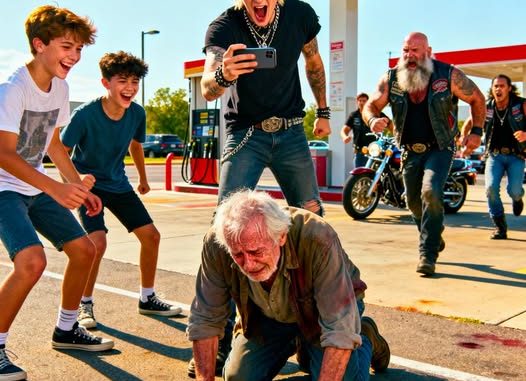
It happened on a quiet afternoon at a small gas station off Highway 49. Harold, an 81-year-old veteran who visited the station every Thursday for coffee and a lottery ticket, was walking toward the door when a misunderstanding occurred between him and a group of young men parked nearby.
Harold politely asked one of them if they could move their car slightly so he could access the handicapped spot. His oxygen tank made walking long distances difficult, and the space helped him get inside safely. But instead of hearing him clearly or understanding the situation, one young man reacted defensively. Words were exchanged, confusion grew, and in the tension of the moment, Harold lost his balance and fell to the ground.
His hearing aid dropped to the pavement, and the young men, startled by the situation, didn’t immediately know how to respond.
What no one realized was that inside the Convenience Store, 47 members of the local motorcycle club — the Savage Riders — were gathered for a meeting. Through the window, they saw Harold on the ground. He wasn’t just any customer to them. He was a familiar face, a kind neighbor, and a man who had helped countless people in town over the years.
Their president, Dennis “Tank” Morrison, stood up and said quietly, “Brothers… let’s check on him.”
The bikers walked out together in calm formation. Their presence wasn’t about intimidation — it was about making sure Harold was safe.
Tank knelt beside Harold. “You alright, sir?” he asked gently. Several bikers helped him sit up while others checked to make sure his oxygen tank and belongings were intact. The young men who had been standing nearby looked overwhelmed, unsure how to fix what had just happened.
Then something unexpected occurred.
A car pulled up, and a young woman in medical scrubs hurried out. She recognized Harold immediately — he had once helped her family during a difficult time. Seeing him shaken, she rushed to his side to help.
Her presence changed the entire tone of the moment. She calmly reassured everyone that Harold just needed a moment to compose himself and that no one had intended harm. She also encouraged the young man involved in the misunderstanding to step forward and speak with Harold directly.
To his credit, the young man did. He apologized sincerely, saying he hadn’t understood Harold’s situation and had reacted without thinking. Harold, steadying himself, accepted the apology. “We all make mistakes,” he said kindly. “What matters is learning from them.”
The bikers nodded in agreement. The moment became one of understanding, not conflict.
Over the next few weeks, the young man began volunteering at the local community center — the same place Harold often helped out. Slowly, they formed an unexpected friendship built on second chances and mutual respect.
Harold still visits the gas station every Thursday. But now, he’s no longer alone. The young man often meets him there to share a coffee, and sometimes the bikers join them too.
What began as a moment of tension became a powerful reminder of something simple:
Communities grow stronger when people choose compassion over conflict — and when strangers step up for one another.